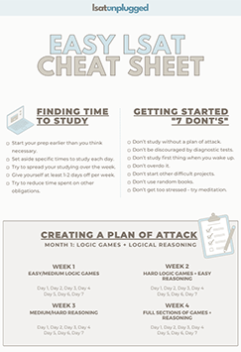Because there’s no guessing penalty on the LSAT, you should fill in a bubble for every answer.
I recently analyzed the LSAT PrepTest Answer Keys from several different angles.
This blog post contains my findings.
I’ll start off with my most-significant findings, which you will find useful.
The rest of the blog post is the data I’ve analyzed, along with some less-significant findings.
Most of that data isn’t too useful, but it’s there if you want to look at it and obsess over the details. If you have an amazing memory, you might want to note some of the more specific findings, but the “most significant” ones are probably enough for 99% of people reading this to remember.
Most-Significant Findings
1. Overall, D is most likely to be the correct answer on the LSAT, and E is the least likely to be the correct answer.
Looking at every released PrepTest answer key from June 1991-December 2009, D is 2.1% more likely than E to be the correct answer.
(However, the variation in likelihood of each letter being the correct answer has grown less extreme over time. Looking only at the answer keys for the last 10 years, D is only 1.7% more likely than E, and over the last 5 years, D is only 1.26% more likely than E. That’s still a significant-enough difference to be worth knowing, though.)
Take-away:
When guessing randomly between a few choices, if you haven’t eliminated D, choose D. Don’t choose E when you’re down to a few choices and can’t decide between them.
If you have to randomly fill in bubbles, choose D.
***
2. In the last 5 answer choices of a given section, D is more likely than others to be the correct answer. A is the least likely.
Take-away:
When guessing randomly on any of the last 5 questions in a section, if you haven’t eliminated D, choose it. Whatever you do, don’t choose A if guessing randomly.
If you run out of time and have to randomly fill in bubbles, choose D. The probabilities vary depending upon the section type, so feel free to look at the data below if interested in the nitty-gritty.
Answer keys from every released PrepTest, from the past 10 years, and from the past 5 years:
Using answer keys from every released LSAT PrepTest (June 1991-December 2009):
D = 21.2%
B = 20.5%
C = 20.1%
A = 19.2%
E = 19.1%
Using answer keys from every released LSAT PrepTest over the past 10 years (June 2000-December 2009):
D = 21.2%
C = 20%
B = 19.8%
A = 19.6%
E = 19.5%
Using answer keys from every released LSAT PrepTest over the past 5 years (June 2005-December 2009):
D = 20.8%
C = 20.2%
B = 19.8%
A = 19.8%
E = 19.5%
Answer keys by section from every PrepTest, from the past 10 years, and from the past 5 years:
Logic Games
Not too much in the way of useful trends here.
Using Logic Games answer keys from every released LSAT PrepTest (June 1991-December 2009):
B = 20.5%
E = 20.3%
D = 20.1%
C = 19.9%
A = 19.3%
Using Logic Games answer keys from every released LSAT PrepTest over the past 10 years (June 2000-December 2009):
C = 20.6%
A = 20.4%
D = 20.3%
E = 19.5%
B = 19.2%
Using Logic Games answer keys from every released LSAT PrepTest over the past 5 years (June 2005-December 2009):
B = 22.1%
C = 20.9%
E = 19.8%
D = 19.2%
A = 18%
Logical Reasoning
In Logical Reasoning, B and D have consistently been the most likely correct answer choices overall, over the past 10 years, and over the past 5 years.
Using Logical Reasoning answer keys from every released LSAT PrepTest (June 1991-December 2009):
D = 21.6%
B = 20.6%
C = 20.3%
E = 19%
A = 18.6%
Using Logical Reasoning answer keys from every released LSAT PrepTest over the past 10 years (June 2000-December 2009):
B = 21.2%
D = 21.1%
C = 20.1%
E = 19.3%
A = 18.3%
Using Logical Reasoning answer keys from every released LSAT PrepTest over the past 5 years (June 2005-December 2009):
D = 21.2%
B = 20.1%
A = 19.9%
C = 19.7%
E = 19.1%
Reading Comprehension
While D and B have been the most likely answer choices overall in RC, B has shifted to become the least likely answer choice over both the last 10 years and the last 5 years. A has risen to become the second-most common answer choice over this period.
Using Reading Comprehension answer keys from every released LSAT PrepTest (June 1991-December 2009):
D = 21.5%
B = 20.1%
A = 19.9%
C = 19.8%
E = 18.6%
Using Reading Comprehension answer keys from every released LSAT PrepTest over the past 10 years (June 2000-December 2009):
D = 22.3%
A = 21.3%
E = 19.6%
C = 19.1%
B = 17.7%
Using Reading Comprehension answer keys from every released LSAT PrepTest over the past 5 years (June 2005-December 2009):
D = 21.3%
A = 21%
C = 20.3%
E = 20.1%
B = 17.3%
***
Looking at the last 5 answer choices per section:
Using only last 5 answers from every released LSAT PrepTest section (June 1991-December 2009):
D = 22.1%
E = 21.3%
B = 20.2%
C = 18.8%
A = 17.7%
Using only last 5 answers from every released LSAT PrepTest section over the past 10 years (June 2000-December 2009):
D = 21.4%
B = 21.4%
E = 20.4%
C = 19.4%
A = 17.5%
Using only last 5 answers from every released LSAT PrepTest section over the past 5 years (June 2005-December 2009):
B = 22%
D = 21.3%
E = 20%
C = 20%
A = 16.67%
Please note that there is a great deal of fluctuation when looking at the last 5 answer choices per section by section type. This is likely due to the fact that we’re working with a very small sample size (in the hundreds, which is very few questions compared to the number of LSAT questions overall – nearly 6,500 in total).
Logic Games
Using only last 5 answers from only the Logic Games section in every released LSAT PrepTest (June 1991-December 2009):
A = 22.5%
D = 20.3%
B = 20.3%
E = 19.4%
C = 17.5%
Using only last 5 answers from only the Logic Games section in every released LSAT PrepTest over the past 10 years (June 2000-December 2009):
D = 22.7%
B = 22%
A = 20.7%
C = 18%
E = 16.7%
Using only last 5 answers from only the Logic Games section in every released LSAT PrepTest over the past 5 years (June 2005-December 2009):
B = 25.3%
D = 24%
E = 20%
C = 16%
A = 14.7%
Logical Reasoning
Using only last 5 answers from only the Logical Reasoning section in every released LSAT PrepTest (June 1991-December 2009):
E = 23.3%
D = 22.7%
B = 19.5%
C = 19.5%
A = 15%
Using only last 5 answers from only the Logical Reasoning section from every released LSAT PrepTest over the past 10 years (June 2000-December 2009):
B = 23.1%
E = 21.7%
C = 21.1%
D = 19.7%
A = 14.4%
Using only
last 5 answers from only the Logical Reasoning section every released LSAT PrepTest over the past 5 years (June 2005-December 2009):
C = 22.7%
B = 20.7%
E = 20%
D = 19.3%
A = 19.3%
Reading Comprehension
Using only last 5 answers from only the Reading Comprehension section in every released LSAT PrepTest (June 1991-December 2009):
D = 22.8%
B = 21.3%
E = 19.1%
C = 18.8%
A = 18.1%
Using only last 5 answers from only the Reading Comprehension section in every released LSAT PrepTest over the past 10 years (June 2000-December 2009):
D = 23.3%
E = 21.3%
A = 20.7%
C = 19.3%
B = 19.3%
Using only last 5 answers from only the Reading Comprehension section in every released LSAT PrepTest over the past 5 years (June 2005-December 2009):
D = 22.7%
B = 21.3%
E = 20%
C = 18.7%
A = 17.3%
Percentages may not add to 100% due to rounding.

